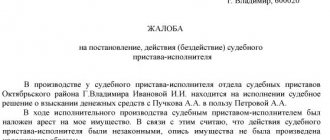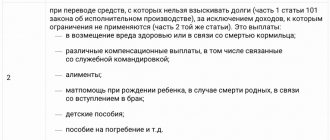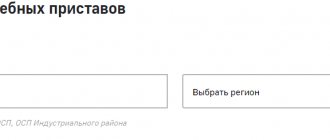Home / Alimony / We draw up a statement to the bailiff about non-payment of alimony (sample attached)
Care for a minor child is divided between two parents in equal shares. And if the spouses do not live together, and one of them cannot take an active part in raising their child, he must help financially. This obligation is prescribed at the legislative level.
Unfortunately, not all parents take a responsible approach to fulfilling their responsibilities. Many even refuse to pay child support benefits. In this article we will examine the issue of collecting alimony: what needs to be done to get money from the debtor? How to write an application to the FSSP service?
General information about alimony
If funds are forcibly withheld, bailiffs are responsible for executing the collection. Their activities are regulated by 229-FZ of 2007.
Cash for minors or disabled relatives can be paid in the following order:
- voluntarily;
- forcibly.
The parties (the alimony payer and the recipient) can independently determine the amount and procedure for paying financial support. The law provides for the possibility of formalizing voluntary payments (notarial agreement) or an oral agreement.
The notarial agreement is governed by Sec. 16 IC RF. Former spouses agree on the amount, frequency, the need for reporting for funds spent and other conditions. They draw up a written agreement and have it certified by a notary.
Important! The established amount cannot be less than the amount of payment required by law. For example, for 2 children, at least 33% of the father’s income.
The document has the force of a writ of execution and is subject to transfer to the FSSP if one of the parties refuses to comply with it.
An oral agreement is not directly provided for by law; however, there are no rules of law prohibiting the parties from independently resolving the issue of payments, without additional documentation.
Compulsory collection is carried out on the basis of a court decision. Depending on the specific situation, a writ of execution may be issued on the basis of a court order or court decision. The order is made by a magistrate when considering an application containing demands solely for alimony. A court decision is issued by a city/district court when considering a claim for alimony and a dispute between parents (child’s place of residence, divorce, division of property).
If the defendant refuses to voluntarily comply with the court decision, the writ of execution is submitted to the Federal Bailiff Service. After which the funds are forcibly withheld.
Package of documents required for consideration of the case
Along with the claim to the magistrate's court, you must provide copies of the following documents:
- identification of the plaintiff;
- children's birth certificates;
- certificates of conclusion and dissolution of a family union;
- a previous court decision establishing obligations to pay alimony.
The following must be submitted in originals:
- a certificate about the family composition of the parties to the process;
- a certificate of the defendant’s income or property belonging to him;
- bailiff's orders that were not fulfilled by the debtor;
- calculation of alimony debt.
How to collect alimony arrears
Payment of amounts of material support on a voluntary basis amounts to no more than 30% of all cases throughout the country. The remaining part of the defendants prefer to refuse timely self-payment.
In such a situation, the recipient has the right to transfer the writ of execution to the SSP. In accordance with the law, collection is carried out by the department located at the place of actual residence of the alimony payer.
An application to the bailiffs for the collection of alimony debt is attached to the writ of execution. The application form can be obtained from the bailiffs department. The sample form must be freely available at the organization’s stand.
The following is provided as an executive document:
- notarized agreement on payment of funds;
- court order;
- writ of execution based on a court decision.
Additionally, you must provide details of a nominal bank account opened in the name of the recipient of the funds. If possible, the applicant can provide information about the payer’s place of residence, employment, and property.
What to do in case of refusal?
There are often cases in which the bailiff does not issue a certificate.
Most often this happens when he has too many documents to work with.
If you are not given a document, you first need to call the FSSP and find out why this is happening. Often the issue can be resolved amicably. If this cannot be done, the only way out is a complaint. You can complain:
- Head of the FSSP department;
- Head of the FSSP Department;
- to the prosecutor's office.
The most effective way is to appeal through the prosecutor's office. The fact is that for violation of the deadlines and procedure for considering appeals and applications of citizens, liability is provided under Article 5.59 of the Code of Administrative Offenses of the Russian Federation.
It is the prosecutors who identify such violations. The threat of being brought to administrative responsibility will force FSSP employees to issue a certificate as soon as possible.
Fines for late applications are quite large - from 5,000 to 10,000 rubles.









